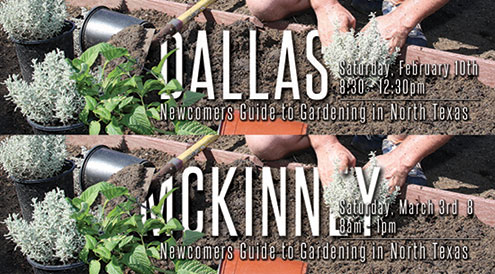DALLAS — Two free public courses aim to equip new gardeners with the tools to establish lush lawns, vibrant landscapes and bountiful vegetable gardens in the unique and unforgiving growing conditions of North Texas, organizers said.
The first session of Newcomers Guide to Gardening in North Texas was Feb. 10, 8:30 a.m.-12:30 p.m., Texas Discovery Gardens at Fair Park, 3601 Martin Luther King Jr. Boulevard, Dallas.
The second installment is March 3, 8 a.m.-1:00 p.m., Collin College Conference Center, 2400 Community Avenue, McKinney.
The courses are conducted by Texas A&M AgriLife Research’s Dallas-based Water University program along with local cities and water providers. Daniel Cunningham and Patrick Dickinson, Texas A&M AgriLife Research horticulturists in Dallas, will lead attendees through comprehensive instruction on gardening basics including soil preparation, effective fertilization, fruits, vegetables, regionally adapted turfgrasses and proper selection of plants.
The duo will also review resource-efficient irrigation and maintenance practices.
“Anyone who joins us will come away with a wealth of practical information that could boost their success in our Texas conditions while saving money and protecting precious resources,” Dickinson said. “Attendees also will have the support of Water University, its free courses all year and its connections in North Texas and the state at large.”

“Dallas/Fort Worth is one of the fastest growing metropolitan areas in the nation,” Cunningham said. “Our influx consists of new homeowners from across the U.S. and other countries. A basic understanding of our sometimes unforgiving conditions can help them produce beautiful, bountiful plants while becoming effective stewards of our natural resources.”
Go to https://wateruniversity.tamu.edu and click “Events Calendar” to RSVP for Newcomers Guide to Gardening in North Texas.
“We have limited capacity for each course; they are free so they fill up fast,” Dickinson said.